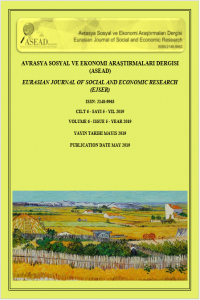Diğer
Yıl 2019,
Cilt: 6 Sayı: 5, 151 - 158, 31.05.2019
Öz
Bu çalışmasının amacı, literatür taraması yolu ile 1990’ların başlarından itibaren popülaritesi artmış olan öğrenen örgütler yaklaşımının nereden geldiği, nasıl geliştiği ve temel düşünce tarzları hakkında bilgi edinilmesidir. Bu amaç doğrultusunda öğrenen örgütlerin gelişiminde temel dayanak noktası olan örgütsel öğrenme ve aralarındaki farklar da açıklanmaya çalışılmıştır.
Anahtar Kelimeler
Kaynakça
- Argyris, C. ve Schön, D. A. (1978). “Organizational learning: A theory of action perspective. Massachusetts”, Addison-Wesley Publishing Company, USA Cook, S. D. N. ve Yanow, D. (1993). “Culture and organizational learning”. Journal of Management Inquiry, 2 (4): 373-390. Day, G. S. (1994). “The capabilities of market-driven organizations”. Journal of Marketing. 58(4): 37-52. Garvin, D. A., Edmondson, A. C. ve Gino, F. (2008). “Is yours a learning organization?” Harvard Business Review, March: 109-116. Jaworski, J.B. ve Kohli, A.K. (1993). “Market orientation: antecedents and consequences”. Journal of Marketing, 57 (3), 53-70. Koç, U. (2004). Komplekslik yaklaşımı ve bilgi yönetimi. 3. Ulusal Bilgi, Ekonomi ve Yönetim Kongresi Bildiriler Kitabı, Eskişehir, Osmangazi Üniversitesi Yayınları: 419 - 432. Koçel, T. (2010). İşletme Yöneticiliği, 12. Baskı. İstanbul: Beta Basım A.Ş. Kogut, B. ve Zander, U. (1992). “Knowledge of the firm, combinative capabilities, and the replication of technology”. Organization Science, 3(3): 383-397. Morgan, G. (2006). “Images of organization”. ABD: Sage. Nonaka, I. (1991). “Managing for the long term”. Best of Harvard Business Review, 2007, Temmuz-Ağustos, 162-171. Nonaka, I. (1994). “A dynamic theory of organizational knowledge creation”. Organization Science, 5(1): 14-37. Nonaka, I. ve Toyama, R. (2003). “The knowledge creating theory revisited: Knowledge creation as a synthesizing process”. Knowledge Management Research Practice, 1(1): 2-10. Örtenblad, A. (2001). “On differences between organizational learning and learning organizations”. The Learning Organization, 8 (3): 125-133. Örtenblad, A. (2002). “Organizational learning: A radical perspective”. International Journal of Management Reviews, 4 (1): 87-100. Örtenblad, A. (2004). “The learning organization: towards an integrated model”. The Learning Organization,11(2): 129-144. Örtenblad, A. (2005). “Viewpoint: Of course organizations can learn!”. The Learning Organization, 12 (2): 213-218. Örtenblad, A. (2007). “Senge’s many faces: Problem or opportunity?”, The Learning Organization, 14 (2): 108-122. Rebelo, T. M. ve Gomez, A. D. (2004). “Organizational learning and the learning organizations”. The Learning Organization, 15 (4): 294-308. Senge, P. M. (1990). Beşinci Disiplin (Çev: Ayşegül İldeniz ve Ahmet Doğukan), 15. Baskı (2011) İstanbul: YKB Yayınları. Senge, P. ve Crainer, S. (2008). “Senge and sensibility”, Business Strategy Review, 19 (4): 71-75. Tsang, E. W. K. (1997). “Organizational learning and the learning organizations: A dichotomy between descriptive and prescriptive research”. Human Relations, 50 (1): 73- 89. Williamson, O. E. (1991). “Comparative economic organization: The analysis of discrete structural alternatives”. Administrative Science Quarterly, 36: 269-296
Toplam 1 adet kaynakça vardır.
Ayrıntılar
| Birincil Dil | Türkçe |
|---|---|
| Bölüm | Makaleler |
| Yazarlar | |
| Yayımlanma Tarihi | 31 Mayıs 2019 |
| Yayımlandığı Sayı | Yıl 2019 Cilt: 6 Sayı: 5 |

